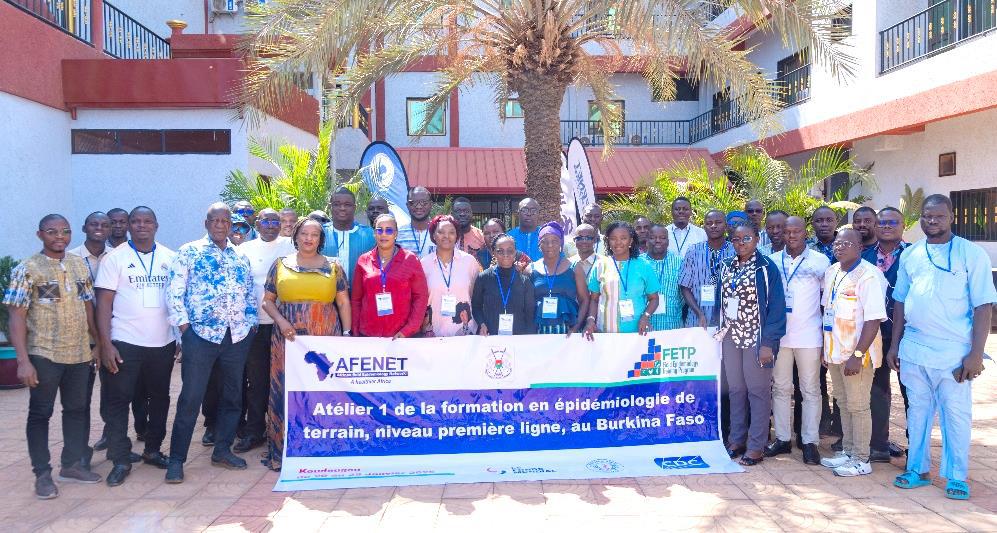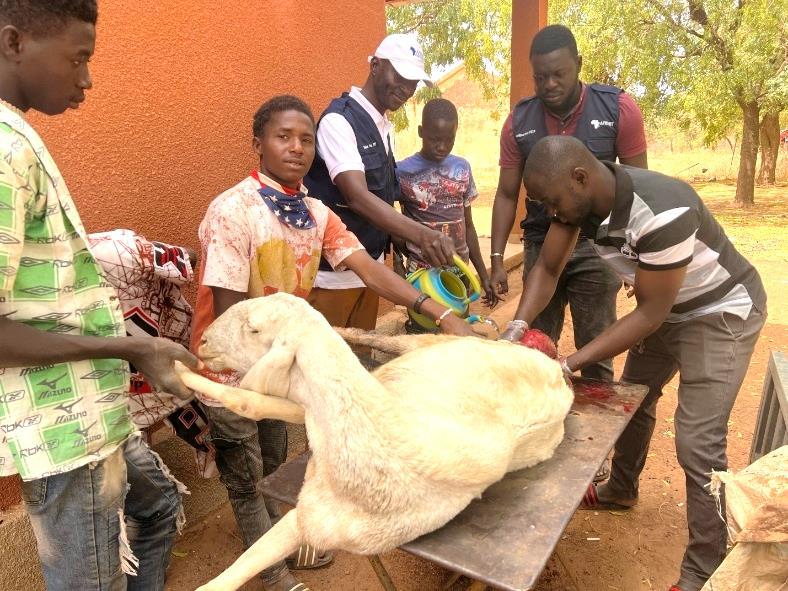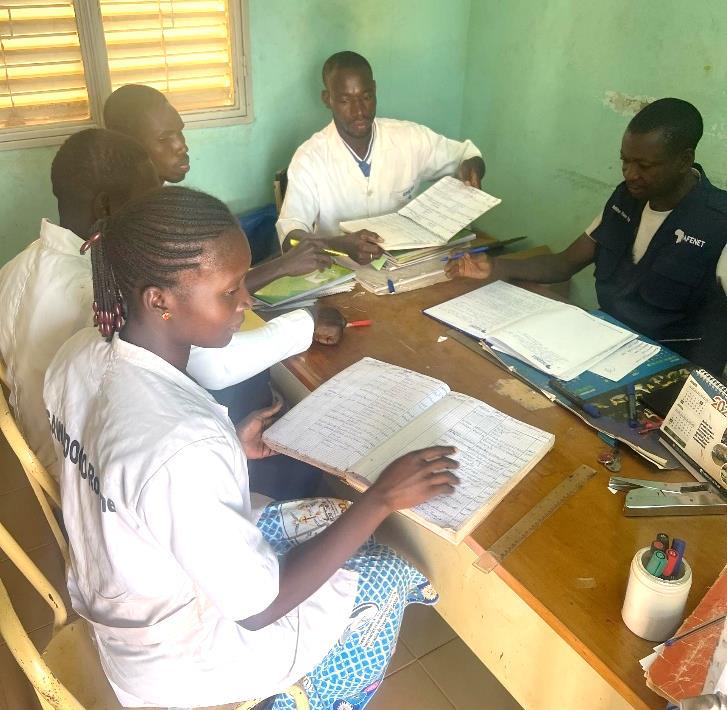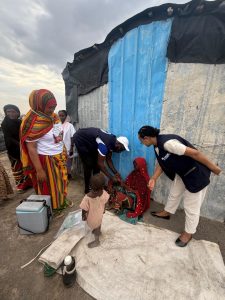Burkina Faso’s Field Epidemiology Training Program – Frontline Cohort 16 Graduates with Impact
-
by
AFENET


The 16th cohort of Burkina Faso’s Field Epidemiology Training Program (FETP-Frontline) has concluded its three-month intensive training with strong achievements and a graduation ceremony held on April 18, 2025, in Ouagadougou.
Highlights of their impact:
- 45 case and outbreak investigations completed
- 75 data quality audits conducted across health facilities, livestock support zones, and forestry posts
- 50 weekly surveillance data summaries produced
- 20 in-depth analyses addressing surveillance data quality issues
- 30 community awareness sessions held, reaching 180 health agents and 310 community members
This cohort of 25 residents, selected from eight districts across nine regions, began their field-based training on January 1, 2025. Their graduation marks another step forward in strengthening Burkina Faso’s public health surveillance and response capabilities.
During the training, each resident conducted an analysis of a pressing health issue using a fishbone (Ishikawa) diagram approach—uncovering root causes and identifying solutions to improve disease detection and response in their local settings.
Cohort 16’s accomplishments reinforce the value of field epidemiology training in building a resilient and responsive health system across the region.
| N° |
Fish head (Central Problem) |
Critical Cause |
Name of Resident |
|---|---|---|---|
| 1 |
Insufficient completion of surveillance data collection tools in health facilities in the Sapouy district |
Insufficient training supervision of health workers on epidemiological surveillance |
TRAORE Aridiata |
| 2 |
Insufficient filling of tools at the CMA of Léo |
Insufficient internal supervision |
OUEDRAOGO Seydou |
| 3 |
Underreporting of epidemic-prone diseases in health facilities in the Sapouy Health District |
Lack of specific oversight of integrated disease surveillance and response |
SANOGO Cheik |
| 4 |
Low involvement of health workers in the collection of surveillance data in the Sig-Noghin health district |
Lack of skills of health workers in collecting surveillance data |
SOME Géraldine |
| 5 |
Low submission of samples to the national livestock laboratory by animal health workers in Burkina Faso |
Lack of awareness of the importance of laboratory confirmation |
SORGHO Bénédicte |
| 6 |
Low data reporting by the UATE of the municipality of Ziniaré |
Lack of awareness of the new list of compulsory illnesses |
OUEDRAOGO Alfred |
| 7 |
Lack of communication of epidemiological data by the UATE of the commune of Kongoussi |
No archiving of data |
ZANGRE Zakaria |
| 8 |
Insufficient data in the UATE of the commune of Ouahigouya |
Lack of data archiving |
OUEDRAOGO Noufou |
| 9 |
Under notification of diseases requiring mandatory notification to the Ouahigouya University Hospital |
Lack of knowledge of notifiable diseases |
NIKIEMA Joséphine |
| 10 |
Under notification of Severe Acute Respiratory Infections |
Insufficient specific formative supervision |
OUEDRAOGO Halidou |
| 11 |
Dengue arbovirosis reported to the medical emergency department of the Ouahigouya University Hospital |
Lack of knowledge among health workers about the diseases under surveillance |
TAPSOBA Franck Williams |
| 12 |
Under-reporting of unusual events at the provincial environmental department level |
Inadequacy of the collection method |
BAKO Adama |
| 13 |
Insufficient data collection on environmental events |
Low awareness among forestry officers regarding the reporting of environmental events |
ZANGO Rasmané |
| 14 |
Under-reporting of diseases and events under surveillance at the CMA of Do |
Insufficient active research |
BELEM Rasmane |
| 15 |
Insufficient filling of registers in health facilities in the Do district |
Lack of training on the importance of data collection |
OUATTARA Mohamed |
| 16 |
Insufficient analysis of surveillance data in health facilities |
Lack of mastery of methods and techniques for processing and analyzing data |
TRAORE ibn Issaka Outouphe |
| 17 |
The low reporting of diseases with epidemic potential and health events in the health facilities of the Sindou Health District |
Lack of competence of health workers in epidemiological surveillance |
OUATTARA Lamine |
| 18 |
Inadequate collection of surveillance data on diseases and potential epidemic events in Léo CMA units |
Insufficient formative supervision by the ECD and CMA managers |
BABOUAN Kassoum |
| 19 |
Discrepancy between data from the mortuary and those from the units of CHU B |
Failure to comply with body management guidelines |
GANOU Anne |
| 20 |
Inadequate analysis and interpretation of data in the Léo health district |
Lack of training supervision from the management team towards health facility agents on the analysis and interpretation of data |
ABDOU Aboubacary |
| 21 |
Inadequate analysis and interpretation of epidemiological data in peripheral veterinary structures in the central region |
Insufficient supervision over the collection and interpretation of surveillance data |
OUEDRAOGO Inès Marie Reine |
| 22 |
Under notification of diseases and events under surveillance at Halassane Coulibaly Hospital |
Lack of internal supervision of agents |
NIKIEMA Séraphin |
| 23 |
Underreporting of diseases with epidemic potential |
Lack of periodic and regular monitoring of notification data |
KABORE Ibrahim Arsène |
| 24 |
Insufficient active search for cases of tuberculosis in the Pouytenga DS |
Lack of specific internal supervision on Tuberculosis |
DAMOLGA Daniel |
| 25 |
Faible capitalisation des données |
Outil de capitalisation non adapté. |
KABRE Massi |




